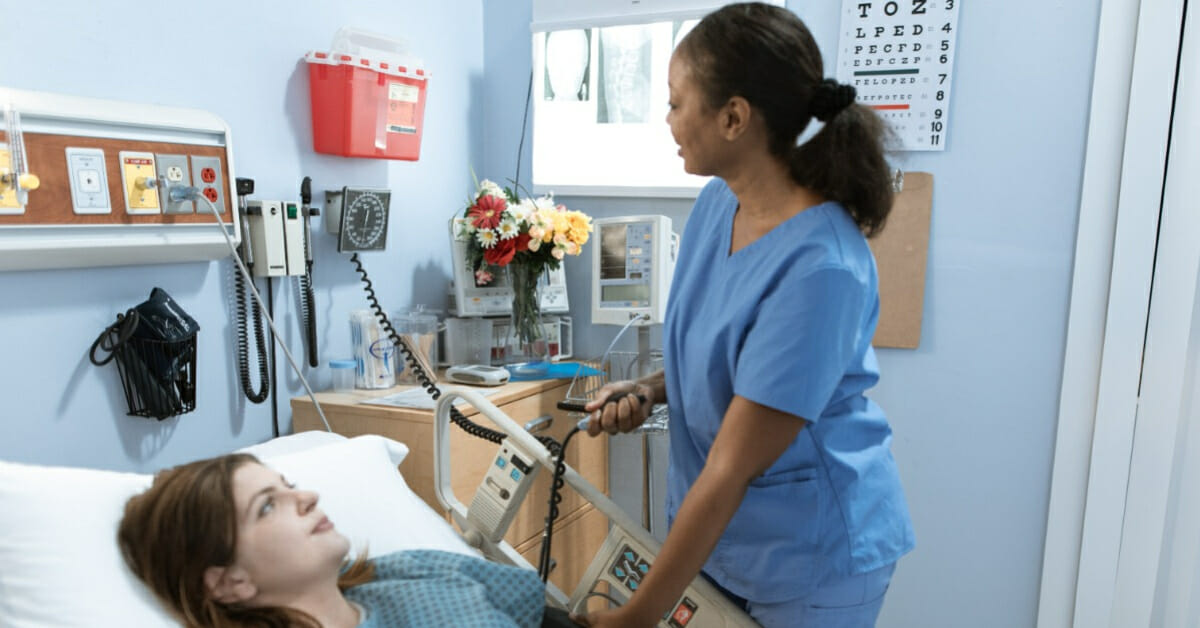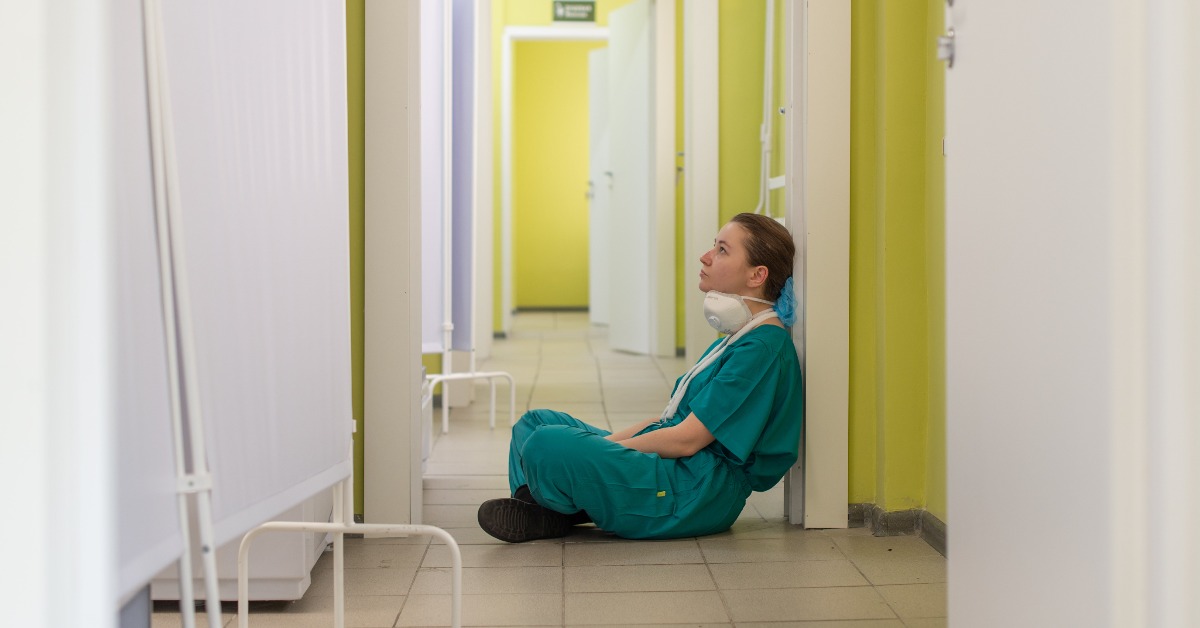Plus, they skills lab be deceptively complex: what starts like a simple demonstration will rapidly lead you to a high-pressure practical test.
These exams (or “skill check-offs”) often act as a gateway before you can move toward more complex parts of the program.
So let’s take a detailed look at the nursing skills lab, its purpose, and the best strategies to excel in it. After all, it’s not just a degree requirement but also a crucial part of becoming a nurse.
What Is the Skills Lab?
On top of its scientific knowledge, nursing is also a very “hands-on” profession. Many procedures you will use to care for patients require a certain degree of skill and fine motor precision.
Your nursing school is responsible for ensuring you know these skills thoroughly before you perform them on a real patient – and this is not something you can master on the first try.
Here is where the skills lab comes in. This is a type of learning setting in which you will learn how to perform the various manual skills necessary for patient care.
At the skills lab, your instructors will teach you how to perform any specific skill – from something as simple as a bed bath to a tracheostomy or a change of dressings. This will be done in front of you using a semi-realistic mannequin.
A few days (or weeks) later, you’ll have to perform the skill again in front of your instructor. If you check every box, you’ll pass or be “checked off,” – and you’ll have to get cracking with the next skill.
Sounds similar? Differences between the skills lab and the simulation lab
Also increasingly popular in nursing schools, simulation labs (or “sim labs”) can be easily confused with skills labs. After all, they are both practical activities involving infamous life-like mannequins that are becoming increasingly popular in nursing schools across the country.
But are they the same? No. Skills lab and sim lab experiences are designed to teach different concepts, have different mechanics, and emphasize distinct parts of your budding skill set.
First, skills labs rarely use the fully-responsive, talking, breathing, or weeping mannequins. Depending on what’s being tested, you can still expect semi-realistic ones – the type whose joints bend realistically – or even just the body part you need, such as the glutes, to practice giving intramuscular injections.
Second, skills labs focus on performing specific tasks correctly. If your lab is about wound care, expect to learn how to change a set of dressings efficiently, within a specified timeframe, minimizing pain and maintaining sterility. Do that, and you’ll be checked off.
On the other hand, simulation labs are scenario-based. You will have to look at a patient’s history, recent notes, and reactions, and you may need to perform different skills as part of a session. Ultimately, simulation labs are supposed to test your decision-making abilities, which is a different can of worms.
Related videos
What to Expect in Your First Skills Lab
Generally, skills labs consist of two parts: the skills lab training session and your skills lab check-off.
Learning at the skills lab
Most skills lab training sessions start with a demonstration.
You’ll most likely have reviewed the skill in the classroom and even watched an instructional video for it – but this is your chance to see it performed up close and ask questions.
At this stage, the instructor will likely list every step required, explain the current best practices for whatever you’re doing, and warn you about the most common mistakes.
Immediately afterward, you will get some practice time, either by yourself, in pairs, or in small groups. During this initial session, you’re not being evaluated yet – so make as many mistakes as you want. Your instructor will watch, give you pointers, or correct your form or posture.
After the session is finished, it will be up to you. Almost all schools allow students to book the lab for additional independent practice. Make sure to do this before the big Check-Off Day.
Skills check-offs
This is the part that’s often intimidating!
Simply put, a skills check-off is an exam, and you should treat it as such. One by one, you will all have to perform the skill correctly in front of your instructor. Most of the time, skills check-offs are a “pass or fail” kind of deal. Do everything correctly, and you are checked off. You can make a small number of tiny mistakes, but just one big (or “critical”) mistake will mean you’ll fail.
What happens if you fail a skills check-off? Well, that depends on your school, and you’ll likely need to get tested again. Until you pass, you might not be able to move on to the next skill or start specific rotations (for example, at my school, you couldn’t go to a medical-surgical unit until getting checked off for wound care).
Failing consecutive skills might mean you’ll need to delay future courses for a semester or take a “pause” from your program. That’s a lot of pressure riding on a single performance!
6 Tips to Ace your Skills Check-off
Your path toward an RN will inevitably require getting checked off on many skills. So how can you make sure none of them derail your graduation date?
1. Memorize every step
You should start working on your next skill before the first training session. Make sure you watch a video of the skill before you come to the lab, and review your textbook and notes to see all the steps involved. Prof. Rhea’s videos always highlight the critical steps and provide close-ups of the most important parts.
Take the course: Clinical Skills for nurses
Gain fundamental skills related to working with patients with Prof. Rhea.
Doing this may feel redundant before class, but lab demonstrations can be crowded, and it’s easy to miss critical details. If you already know what steps you’ll be looking out for, you’ll be able to follow your lecturer’s instructions better.
2. Stay on top of your lecturer
During your training session, resist the temptation to hang around at the back or get distracted, even if you’re super tired. There’s a good chance that the day’s instructor will also be in charge of your check-off, so this is the best chance to learn what they’ll be looking for.
Make sure you ask questions about anything that is not super clear.
Remember to ask about the most common mistakes and whether each would be critical. Also, if something is different from what’s shown in your textbooks, ask why: often, best practice standards can change from one year to the next. Make sure you know the set of rules that will apply to you!
3. Offer yourself as a volunteer
Lab instructors often call for a student to volunteer during the demonstration, either as a patient or to make the first attempt. Take this as a chance to get a first-row look at the action. Yes, it’s embarrassing if you get it wrong in front of everyone – but grading hasn’t started yet, so it’s a safe time to make mistakes.
4. Get familiar with your lab after-hours
And bring a study buddy!
After your lab training session, you may have anywhere between a few days and a few weeks before it’s time for the check-off. The more practice you get before that, the better. Pair up with a friend or two and book your lab for independent study or “office hours.”
Then, take turns practicing the skill on the mannequins and recording each other. You can review these recordings later and compare them with your checklists and mandatory steps. This will help you spot any mistakes you didn’t notice right away.
Alternatively, just have your lab buddies pretend to be the examiner or alert you of any steps you’ve missed.
5. Train your hand muscles
As we mentioned before, many nursing skills are very “hands-on” and will require you to develop your muscle memory. The best way to do this? By performing specific movements over and over again.
You can practice this at home, even after you’ve used up all your lab’s office hours. Practice stitching or insertion movements in the air. Perform a head-to-toe assessment on your family, or imagine one with your favorite book character. Make your own dummy with pillows or a stuffed shirt and practice moving patients or CPR.
Make sure you recite every step as you perform it. This will help you memorize and keep track of them better during your exam.
6. Take a deep breath before the big day
With so much riding on it, some performance anxiety will be unavoidable during your skills check-offs. Trying to keep the lid on your bubbling anxiety is easier said than done, so at the very least, try not to add to the jitters:
- Have a good breakfast, but keep the caffeine light
- Have a relaxing mantra or some relaxation music at hand while you wait for your turn
- If you catch yourself making a mistake, take a deep breath and ask the instructor to start over
- Remember: nursing school is all about learning. Most schools will give you at least three tries for each skills lab, and most nurses will need a second try at some point. So even if you don’t pass it this time, ask your instructors what you did wrong and keep practicing.
Final Thoughts
Skills labs are a necessary part of nursing school: they help the school ensure you are ready to face flesh-and-bone patients. You don’t have to be perfect on the first try – that will come with practice, years after graduation.
With lots of study, dedication, and access to well-designed materials, you’ll have the best chance at success. And that’s not just for your skills labs but throughout your nursing career!






